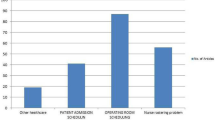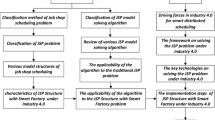Abstract
We consider single-machine scheduling problems with time and position dependent job processing times. In many industrial settings, the processing time of a job changes due to either job deterioration over time or machine/worker’s learning through experiences. In the models we study, each job has its normal processing time. However, a job’s actual processing time depends on when its processing starts and how many jobs have completed before its start. We prove that the classical SPT (Shortest Processing Time) rule remains optimal when we minimize the makespan or the total completion time. For problems of minimizing the total weighted completion time, the maximum lateness, and the discounted total weighted completion time, we present heuristic sequencing rules and analyze the worst-case bounds for performance ratios. We also show that these heuristic rules can be optimal under some agreeable conditions between the normal processing times and job due dates or weights.
Similar content being viewed by others
References
Bachman, A., Cheng, T. C. E., Janiak, A., & Ng, C. T. (2002). Scheduling start time dependent jobs to minimize the total weighted completion time. Journal of the Operational Research Society, 53, 688–693.
Biskup, D. (1999). Single-machine scheduling with learning considerations. European Journal of Operational Research, 115, 173–178.
Biskup, D. (2008). A state-of-the-art review on scheduling with learning effect. European Journal of Operational Research, 188, 315–329.
Browne, S., & Yechiali, U. (1990). Scheduling deteriorating jobs on a single processor. Operations Research, 38, 495–498.
Cheng, T. C. E., & Wang, G. (2000). Single machine scheduling problems with learning effect considerations. Annal of Operations Research, 98, 273–290.
Gawiejnowicz, S. (2008). Time-dependent scheduling. Berlin: Springer.
Graham, R. L., Lawler, E. L., Lenstra, J. K., & Rinnooy Kan, A. H. G. (1979). Optimization and approximation in deterministic sequencing and scheduling: a survey. Annals of Discrete Mathematics, 5, 287–326.
Gupta, J. N. D., & Gupta, S. K. (1988). Single facility scheduling with nonlinear processing times. Computers and Industrial Engineering, 14, 387–393.
Ho, K. I. J., Leung, J. Y. T., & Wei, W. D. (1993). Complexity of scheduling tasks with time-dependent execution times. Information Processing Letter, 48, 315–320.
Kise, H., Ibaraki, T., & Mine, H. (1979). Performance analysis of six approximation algorithms for the one-machine maximum lateness scheduling problem with ready times. Journal of the. Operational Research, Society of Japan, 22, 205–224.
Lee, W. C. (2004). A note on deteriorating jobs and learning in single-machine scheduling problems. International Journal of Business and Economics, 3, 83–89.
Lee, W. C., & Wu, C. C. (2009). Some single-machine and m-machine flowshop scheduling problems with learning considerations. Information Sciences, 179(7), 3885–3892.
Mosheiov, G. (1991). V-shaped policies for scheduling deteriorating jobs. Operations Research, 39, 979–991.
Mosheiov, G. (1994). Scheduling jobs under simple linear deterioration. Computers and Operations Research, 21, 653–659.
Mosheiov, G. (2001). Scheduling problems with a learning effect. European of Journal Operation Research, 132, 687–692.
Mosheiov, G., & Sidney, J. B. (2003). Scheduling with general job-dependent learning curves. European of Journal Operation Research, 147, 665–670.
Mosheiov, G., & Sidney, J. B. (2005). Note on scheduling with general learning curves to minimize the number of tardy jobs. Journal of Operation Research Society, 56, 110–112.
Pegels, C. C. (1969). On startup or learning curves: an expanded view. AIIE Transactions, 1, 316–322.
Pinedo, M. (2008). Scheduling: Theory algorithms and systems. Prentice-Hall: Englewood Cliffs.
Smith, W. E. (1956). Various optimizers for single-stage production. Naval Research Logistics, 3, 59–66.
Wang, J. B. (2005). Flow shop scheduling jobs with position-dependent processing times. Journal of Applied Mathematics and Computing, 18, 383–391.
Wang, J. B., & Cheng, T. C. E. (2007). Scheduling problems with the effects of deterioration and learning. Asia-Pacific Journal of Operational Research, 24, 245–261.
Wang, J. B., Liu, L. L. (2009). Two-machine flow shop scheduling with linear decreasing job deterioration. Computer and Industrial Engineering, 56, 1487–1493.
Wang, J. B., & Xia, Z. Q. (2005). Flow-shop scheduling with a learning effect. Journal of the Operational Research Society, 56, 1325–1330.
Wang, J. B., Wang, D., Wang, L. Y., Lin, L., Yin, N., & Wang, W. W. (2009). Single machine scheduling with exponential time-dependent learning effect and past-sequence-dependent setup times. Computers and Mathematics with Applications, 57, 9–16.
Wang, J. B., Sun, L., & Sun, L. (2010). Single machine scheduling with exponential sum-of-logarithm-processing-times based learning effect. Applied Mathematics and Modelling, 34, 2813–2819.
Yang, S. J. (2010). Single-machine scheduling problems with both start-time dependent learning and position dependent aging effects under deteriorating maintenance consideration. Applied Mathematics and Computation, 217, 3321–3329.
Yang, D. L., & Kuo, W. H. (2010). Some scheduling problems with deteriorating jobs and learning effects. Computers and Industrial Engineering, 58, 25–28.
Author information
Authors and Affiliations
Corresponding author
Rights and permissions
About this article
Cite this article
Zhang, X., Yan, G., Huang, W. et al. Single-machine scheduling problems with time and position dependent processing times. Ann Oper Res 186, 345–356 (2011). https://doi.org/10.1007/s10479-011-0835-1
Published:
Issue Date:
DOI: https://doi.org/10.1007/s10479-011-0835-1




